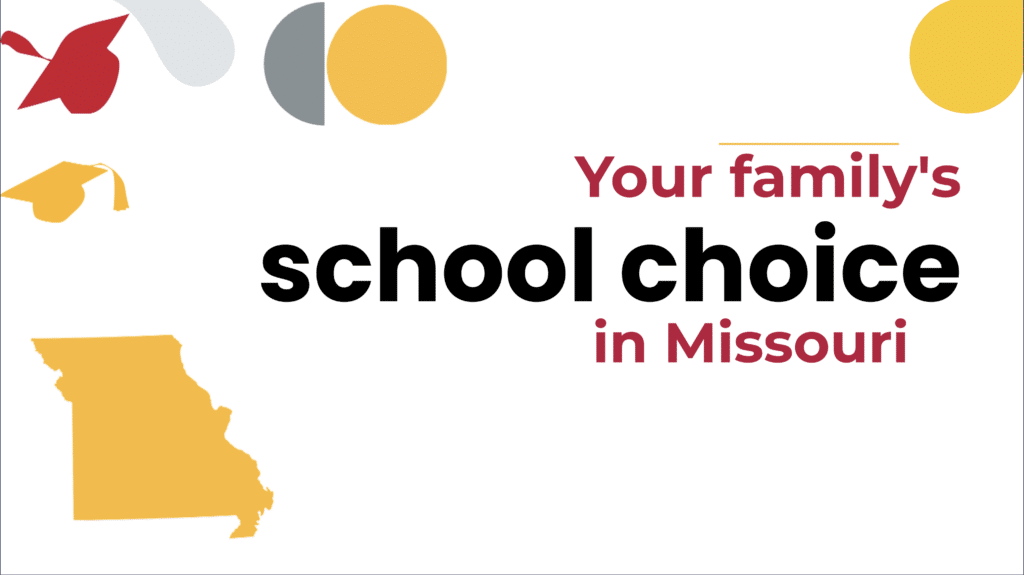Choosing a school? You’ve got options.
Each spring, parents face one of the biggest decisions they can make for their child’s future: What school environment will their child spend about 1,000 hours in next year? Let’s dive in to School Choice in Missouri.
Making that decision with confidence starts with knowing what options you have; you may have more school choices than you realize! Understanding these options can help you find a school where your child grows and learns to the best of their ability. Missouri families can choose from traditional public schools, public charter schools, public magnet schools, private schools, online learning, homeschooling, and microschooling and mix-and-match learning.
What’s new in 2024?
Student eligibility for MOScholars Empowerment Scholarship Accounts is expanding and public charter school access is increasing benefitting more students!

- Traditional Public Schools
- Public Charter Schools
- Public Magnet Schools
- Private Schools
- Online Schools
- Homeschool
- Microschooling
Missouri Traditional Public Schools
The most common school choice in Missouri is traditional public school. In fact, 80.4% of all K-12 students attend a traditional public school in Missouri. Districts operate traditional public schools, which are free to attend, open to all students, and funded by taxpayers. Did you know that on average, Missouri spends $11,865 per public school student each year? You can search your school’s spending and that of nearby schools at Project Nickel.
One thing that makes Missouri public school districts unique is that many of them (about 160 districts) actually use a shortened week model. Many schools holding classes just four days a week are rural ones.
In Missouri, parents have restricted open enrollment. Open enrollment refers to whether you can send your child to a public school other than your assigned school. Some Missouri parents, such as those who live in school districts that have lost state accreditation, may be able to choose any traditional public school in another district for their child. In some cases, including when transferring from a public school that is unaccredited, the district provides transportation.
Open enrollment is an important form of public school choice, widening parents’ options and ensuring that their zip code isn’t the sole determiner of their education. You can find out if you have access to open enrollment by contacting your local district. In general, Missouri districts can set their own guidelines for transfers within districts. So, dates and application procedures for transfers can vary. For an example of the transfer process and timeline, check out Springfield Public Schools’ guidelines.
Find out more about public schools in your state at the Missouri Department of Education & Secondary Education. You can also read more at “Public Schools Without Boundaries: A 50-State Ranking.”
Missouri Charter Schools
Charter schools are another tuition-free public school option for families. Currently, Missouri only has charter schools in the St. Louis and Kansas City areas. There are more than 60 charter schools between the two cities. In 2024, a bill was passed to expand the areas where charter schools can be established, including Boone County. Keep an eye out for potential charter school opportunities in the near future! In Missouri, 2.5% of all K-12 students attend a public charter school.
Like traditional public schools, charter schools are public, free, and usually have no requirements for entry. What distinguishes charter schools is that they are allowed extra freedom to innovate with curriculum and learning methods and held accountable to authorizing bodies for results.
Each school has a charter which explains the school’s purpose and what specific community need it serves, whether that be providing a language immersion program or offering a rigorous, literacy-based curriculum. If there are more families seeking admittance to a charter school than there are seats, a lottery system (like drawing random names out of a hat!) is usually used to determine admittance.
K-5 students who attend eligible charter schools may soon be eligible to receive mailed books at their reading level from an at-home reading program.
Free transportation is available to some students who attend charter schools in Missouri and live within the district where their charter school is located under certain circumstances. For example, if a student is enrolled in a charter school due to transportation difficulties, the school district is required to provide transportation for that student.
You can learn more about your state’s charter school options at the Missouri Charter Public School Association.
Missouri Magnet Schools
You can also choose magnet schools! In Missouri, 1.4% of all K-12 students attend a public magnet school. Magnet schools are free public schools that allow kids to narrow in on a specific learning track, such as engineering or the performing arts. At a magnet school, all the subjects are taught through the lenses of that specific track.
Missouri has several magnet schools throughout the state. For more information, you can check out a sampling of the magnet elementary schools available in the St. Louis Public School district. Kansas City Public Schools and Springfield Public Schools also have magnet schools. In fact, Springfield Public Schools is opening a new magnet program in 2023-2024 called Fly SPS. Students will have the opportunity to study aviation and earn a private pilot’s license while also earning high school and college credit.
Another new magnet school in Springfield is AgAcademy, which opened last year. AgAcademy focuses on the importance of agriculture for Missouri’s economy and is located at Missouri State’s Darr Agricultural Center.
Missouri Private Schools
Families in Missouri can also consider private schools, nonpublic schools that charge tuition. Private schools may offer a unique curriculum, smaller class sizes, or a faith-based tradition. Missouri’s private schools come in all shapes and forms, from religious schools to schools designed for children with special needs.
There are more than 660 private schools across the state of Missouri. The average tuition for private schools in the state is $9,987 for elementary schools and $12,434 for high schools.
In 2024, the MOScholars education savings account program in Missouri was expanded statewide. This program offers flexible scholarship funds that can be used by families to attend eligible public, charter, virtual, private, or homeschooling. Additionally, families can use the funds for educational therapy or school transportation. To be eligible for this program, students must have an Individualized Education Plan (IEP) or be from families earning up to 300 percent of the federal free-and-reduced-price lunch program.
Learn more at the Today and Tomorrow Educational Foundation and Private School Review: Missouri.
Missouri Online Learning
Don’t overlook online learning, which offers a uniquely flexible learning environment that meets a variety of family needs. Whether your child wants to accelerate his or her learning or needs a quieter environment in which to focus, you may be interested in giving virtual school a try.
Missouri public school students have access to individual online courses or free, full-time online programs primarily through MOCAP (Missouri Course Access and Virtual School Program). In order to participate, students must get enrollment approved by their resident school district. (Missouri is one of the only states with such a requirement for switching to online school.) Some districts only allow classes to be taken on campus, while others allow for full-time virtual learning, such as through Missouri Virtual Academy or Missouri Connections Academy.
Students must be currently enrolled in a Missouri public school to switch to online courses through MOCAP. Any non-public student in Missouri, from kindergarten through 12th grade may be able to enroll through the district and take courses online through MOCAP for a fee. In some cases, such as students having certain medical conditions, the tuition can be waived.
Another virtual learning program that partners with many Missouri districts is Launch Virtual Learning. You can check Launch’s member directory to see if your child’s school partners with Launch. If so, your child may be able to enroll in Launch’s part-time or full-time online courses for free through your home district.
There are also some district online learning programs, such as R-7 Online Academy, Columbia Public Schools Virtual School, Douglas County School District’s Choice Online Learning, North Kansas City Schools’ Virtual Learning, and SLPS Virtual Learning program.
Unfortunately, some families applying to Missouri online schools have experienced administrative delays or been challenged by their school district. In response, a bill passed in summer 2022 seeks to streamline the application process and improve families’ access to virtual schooling. To read more about online learning in Missouri, check out the Digital Learning Collaborative’s state profile.
Missouri Homeschooling
Homeschooling is another school option. Homeschooling is the process of parents educating students at home and is permitted in all 50 states.
In Missouri, 6.2% of all K-12 students are homeschooled. The state does not require notice of your intent to homeschool; however, it is recommended that you formally withdraw from your public school so your student is not marked truant. For Missouri homeschoolers, the state requires families to teach specific subjects (like reading, writing, math, and science) but does not require specific standardized testing. Note that homeschool students may be eligible to participate in sports or activities at their local public school if they enroll there part-time.
As of 2024, qualifying homeschool students may be eligible to participate in the MOScholars Program. This program grants scholarships to students with special needs or from low-income families to use for certain educational expenses. Note that families who choose to participate may be required to undergo background checks and students may be required to take standardized tests.
You can also check out Home School Legal Defense Association – Missouri, Midwest Parent Educators, the Missouri Families for Home Education, and the Missouri Association of Teaching Christian Homes, Inc. (MATCH).
Missouri Microschools and Mix-and-Match Learning
Today, some Missouri families are mixing and matching school options to come up with new ways to personalize education. Microschools are one of these ways. A microschool refers to students gathering together in a small group – with adult supervision – to learn, explore, and socialize. Microschools can take a variety of shapes and legal forms, from homeschoolers coming together at an enrichment center to a private school committed to small classrooms. What microschools share in common is a commitment to small-group learning and close-knit relationships, along with an emphasis on children as individual learners.
Here are real examples of microschools and innovative learning resources in Missouri:
CASCO Learning in St. Louis is a Spanish immersive learning collaborative center for families. The learning center offers enrichment classes, parent workshops, and even international learning trips.
Juniper Root Woodland Microschool in Chesterfield is a child-led, nature play-based learning community.
Lighthouse International is an Acton Academy-style microschool in Lake St. Louis.
Little Leaders Academy is an in-home program for pre-K through 1st grade children. The academy focuses on outdoor experiences, whole child learning, leadership, and hands-on activities.
Cale Academy is a learning environment based in Columbia that prioritizes student-centered and learning-style education.
EDGE is a globally-focused microschool serving highschoolers residing within Liberty Public Schools.
An annual “Remake Learning Days” event in Kansas City encourages teachers, students, and families to learn in-person in the community through events and hands-on learning.
Remember, microschooling is more a mentality than a specific legal distinction in most cases. Often, a family participates in a microschool while legally homeschooling, or being enrolled in a private or online school.
Search for Schools Near Me
Microschooling and Mix-and-Match Learning
How can it empower parents and help kids achieve their dreams?
7 Step Guide
Tips to help you find a school where your daughter or son will learn, succeed, and be happy.
Education Resources for
Missouri Parents
For additional information about school choices in Missouri, visit these resources:
Every state is different when it comes to school choice options.
Sign up below to get a detailed comparison:
"*" indicates required fields
